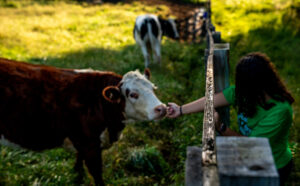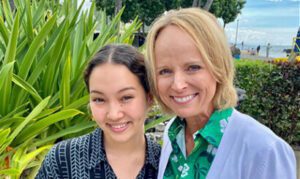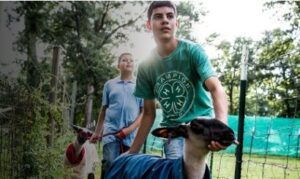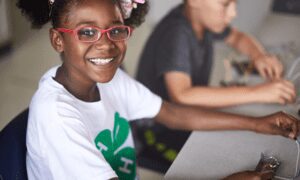Kyle Bridgeforth (KB): I went to a small school in Alabama where a 4‑H leader would visit every month or two to show us projects. Outside of the classroom, the 4‑H program would take us to tree farms and other outdoor activities. Although I grew up on a farm, I experienced agriculture with my classmates in fun ways.
Share how your experiences or the skills learned in 4‑H influenced or guided your career path.
KB: Growing up on a farm and being involved in agriculture was the guiding light for my entire career. I learned that being outdoors and being engaged in the community are passions for me. I wanted those experiences to be a part of my career and lifestyle. Participating in 4‑H gave me a project-based mentality. Before I start the process of growing a crop, I’m thinking about the end goal rather than just the goal at hand. With my 4‑H experience in mind, I start a project and see it through.
When beginning my career journey, I had multiple career opportunities and jobs before I settled into farming. In college, I interned at a bank. I later worked in Washington, D.C. for the United States Trade Representative, where I worked on the agricultural side of free trade agreements. Then, I found myself back in farming. I give 4‑H and the farm I grew up on credit for that.
Who were some of your influences or mentors growing up?
KB: I’m blessed and fortunate to be a fifth-generation farmer, so our family’s history was something we talked about every day. From the first generation to the fourth generation post-slavery, I heard stories about what farming was like for all of those generational experiences. I learned about our second-generation’s goals of going to college and growing a business during the Jim Crow era. Those stories influenced my perspective on farming and work life in general.
My family is my community, and they are great examples for me. In popular media, Martin Luther King is a huge influence for me. Although he’s someone I never met, I went to Morehouse College because of his legacy and how much he impacted me at a young age.
In a 2019 New York Times article, your uncle stated of your grandfather: “His goal, and his father’s goal, was to do everything they could do to keep the land and pass it on to the next generation better than they found it.” Talk about what that statement means to you as a fifth-generation farmer.
KB: Well, I think it’s a great reminder that in all things, the first step is to survive and make it to the next year. It was a large and ambitious goal, and that mindset still sticks with me today. While it may not be as dire now as it was back then, we try to keep that mentality. Yes, it’s a business and a farm. But we always take an ethical, moral approach to the work that we do. When dealing with land, the decisions you make today will affect you for the next ten years. So we always have a long-term approach, and the decisions we make naturally flow into our lifestyles. I’m always looking ahead. And that’s a great example set by early founders of the farm.
How do you keep your son in mind? What are you doing today to prepare your son to fill your shoes and those before you?
KB: Well, it seems that after I had a kid, he became a part of those long-term goals. We need to ensure that the farm and business are in good shape. As challenging as the farming industry is, it takes preparation, dedication and commitment to ensure that we’re running an efficient business that will be around by the time he’s my age. We also try to embrace as much growth and technology as possible. I hope his interest is in farming. I’m certainly not going to pressure him into it, especially if it’s not something that he innately wants to do. But I want to be there for him no matter what his goals are. I want there to be a business here that he feels like he can fit into. And we do that just by keeping a healthy, positive, stable, and family-oriented culture, while still preparing to teach him as much about the farm and the business as I can.
Describe some opportunities available for African American youth to help foster their passion for agriculture. How can those opportunities create life-changing experiences?
KB: Within farming, the Black community is largely underrepresented, as well as our culture in the industry. A young Black kid who’s never been on a farm or doesn’t know anyone that’s worked on a farm may not understand the benefits of agriculture. So, I think it starts with exposure. And that experience can change career or lifestyle goals. It can open up opportunities that they didn’t know existed. I believe it is important, especially for young Black kids, to understand that agriculture is a massive industry. It doesn’t always mean working in a field every day. Whether it’s digital marketing, finance, health science, or any other element within agriculture, you have to be exposed to the industry to find your fit. There are a lot of big companies and money in the agriculture space. I’d like to see more recruitment from larger companies, like USDA, Bayer, Dow DuPont. And even recruitment from historically Black colleges and universities.
Lastly, how do you hope your work and passion will inspire the next generation of Black and diverse farmers?
KB: Hopefully, I can be a testament. I hope that others will relate to the story I tell and the experiences I’ve had. I want to be an example of how your passion for agriculture can help you find your place in the industry.

This interview is a part of a series of blogs supporting 4‑H’s Community Impact program emphasizing Diversity, Equity, Inclusion – an effort sponsored by Nationwide®
Nationwide, the Nationwide N and Eagle and Nationwide is on your side are service marks of Nationwide Mutual Insurance Company. © 2021 Nationwide
















